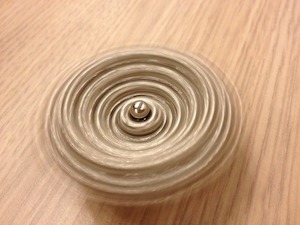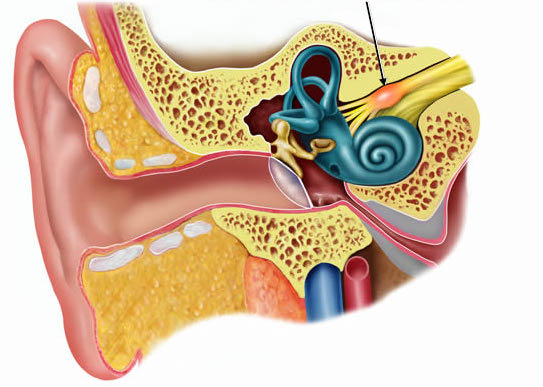Vestibular neuritis is a disorder that affects the vestibular nerve causing an isolated attack of severe vertigo. Learn the symptoms, causes and treatments of this affliction:
Symptoms and causes of vestibular neuritis
This disorder affects the vestibular system and is produced by the nerve inflammation located in the inner ear. It is responsible for sending the brain the signs that control the balance.
It is frequently caused by a virus, an infection that may occur in the respiratory system or in the gastrointestinal system, causing an inflammation of the vestibular nerve. Thus, the transmission of information collected by the nerve is disturbed and is not consistent with the rest of body receptors, such as vision, which leads to an altered sense of balance.

Other causes may be: decreased blood flow of the inner ear, exposure to toxic agents or allergic substances that affect the vestibular nerve.
Symptoms of vestibular neuritis
Symptoms of vestibular neuritis are characterised by an isolated vertigo attack that may last between 24 – 48 hours, spinning sensation and lack of balance, followed by nausea, dizziness and sweating. This disorder disappears gradually after the initial episode and often persists around 7 and 10 days. Vestibular neuritis is different from Ménière’s disease and Labyrinthitis because of the absence of tinnitus and hearing loss concomitant, as it does not affect the audition.
Patients experience during the first few days an ocular movement known as nystagmus, involuntary quick horizontally movement of the eye and slowly return to the initial eye position. The eye movement in vestibular neuritis patients is produced horizontally to the healthy side.
Diagnosis and treatment of vestibular neuritis
Through the patient’s symptoms description and physical exploration, the specialist will diagnose vestibular neuritis. Also, an otologic examination and a complete neurological exam will be conducted. In some cases an audiometry could be carried out in order to verify if there is any hearing affectation and reject other afflictions.

For the vestibular neuritis treatment are used: antiemetic, antihistamines or benzodiazepines taking into account that nausea and vomits do not allow the oral administration. It is not advisable long term use of these medicines, as they can delay vestibular compensation.
Later, rehab techniques through physiotherapy will be incorporated, where body movements appropriate for each recovery phase will be performed. Brain will get used to the movements and the symptoms will improve.
Have you ever suffered vestibular neuritis and do you want to share your experience?
Looking forward to reading you at the comments below.

Dear Sir, I have been affected the same problem since last 5 months and could not recover it despite check up various doctors and Audiologist. Finally they suggested for hearing aid which is being used by me last two months but it is also creating some noise trouble for me. Kindly help me in this regard please. Zafar Amar ( Pakistan)
Thank you for sharing your experience. As we always say, the specialist will be the one who can best diagnose your case. Best regards.
I sure have experienced vestibular neuritis and it’s very debilitating! I do the manoeuvres which help however it lasts for a few days the fuzziness in my head. started about 3 years ago and now I get it at least three times a year if not more
Thanks a lot for sharing your experience with us, Rhonda.
Yes, I am currently suffering with this. There is a real misunderstanding and lack of knowledge on the Healthcare front about this. It also goes hand in hand with mental illnesses such as acute Anxiety and Panic Attacks. I have been doing VRT to retrain my Brain to learn to balance. Hopefully I will get there! But it’s been a long journey. I’m genuinely shocked at the lack of support around this illness and given how widespread it is, it’s not plausible why there’s little recognition.
Thanks for sharing your personal experience with us, Laura. Unfortunately it is still a little known disease, as you say. Let’s hope that little by little it will gain recognition and more research is done.
I began getting vertigo suddenly a week after surgery on my face. I had stitches removed and when I got home I took a nap and woke up with throbbing head pain and severe vertigo some hours later. That was 6 weeks ago and I took meclizine which didn’t help. My face feels numb and the head pain is always in the same area on the left side of my head. I had stiff neck the first couple of days but the vertigo and headaches have been every single day for 6 weeks now. I have no hearing loss, I wear glasses so can’t tell if my vision is worse or not, I tried to do BPPV exercises but they made me vomit. I’m not sure what I should do, GP doesn’t seem concerned but I am. In 35 and have otherwise clean health record. What could this be?
Thanks for sharing your experience with us, Holly! Unfortunately we do not have the solution. However, we recommend you not to give up and keep going to different specialists to diagnose your case.